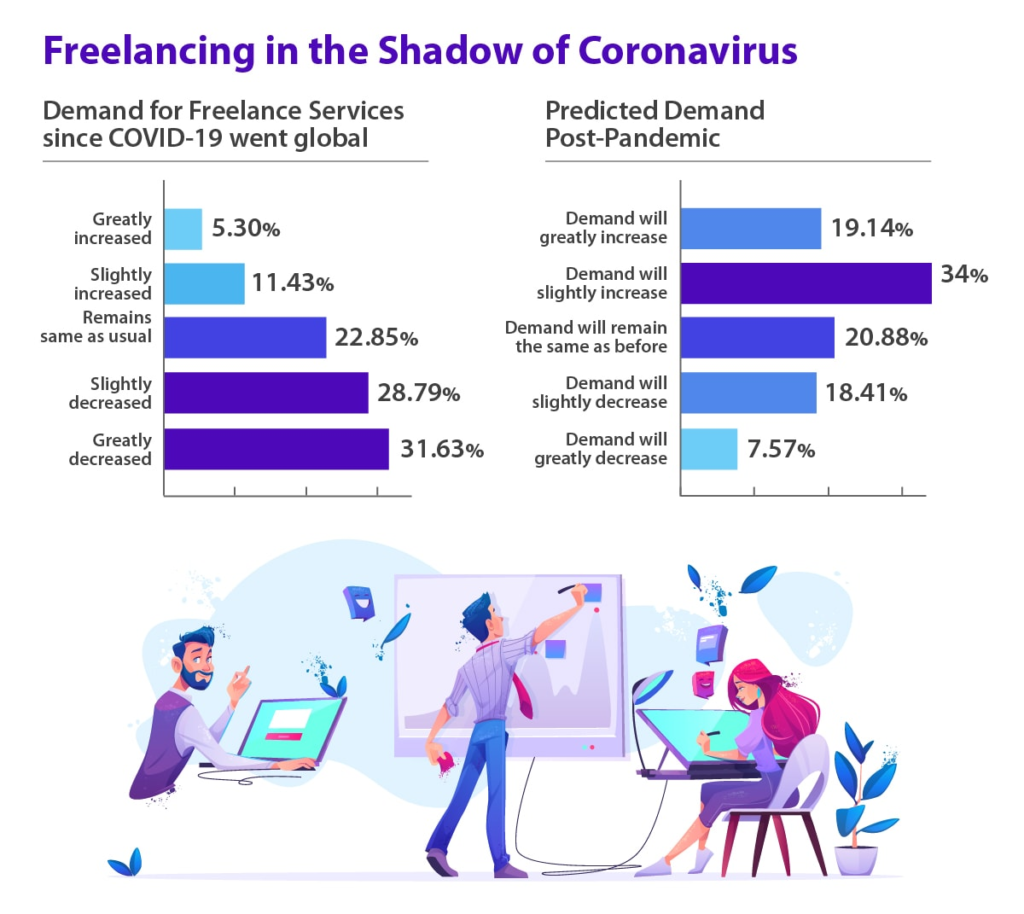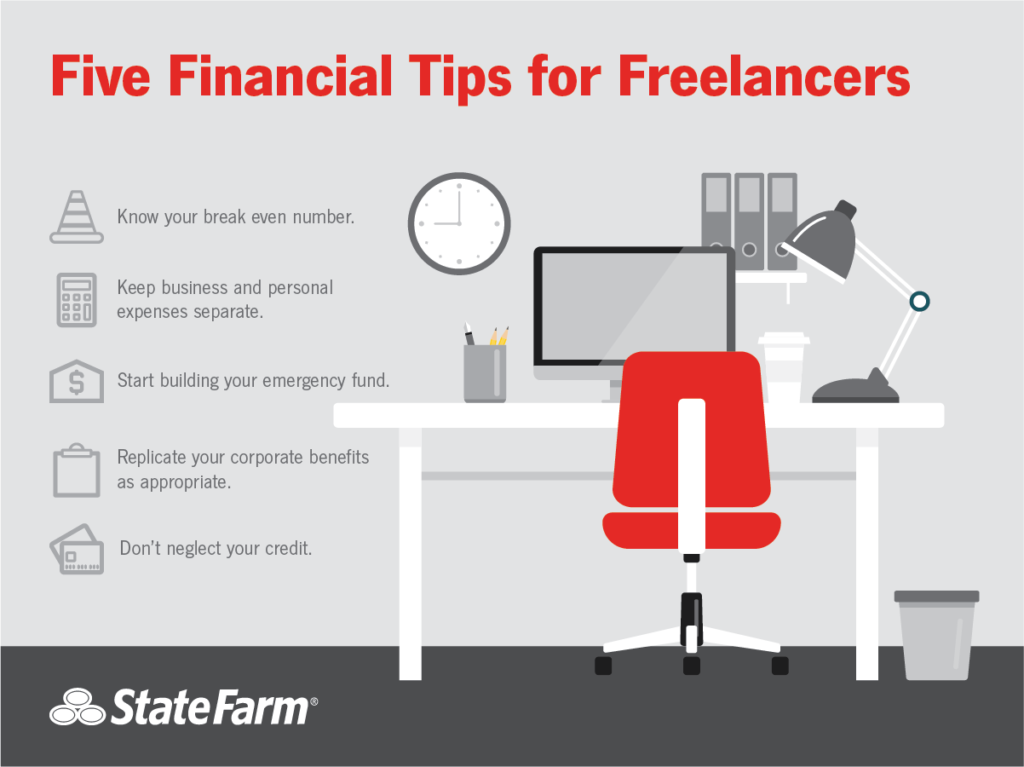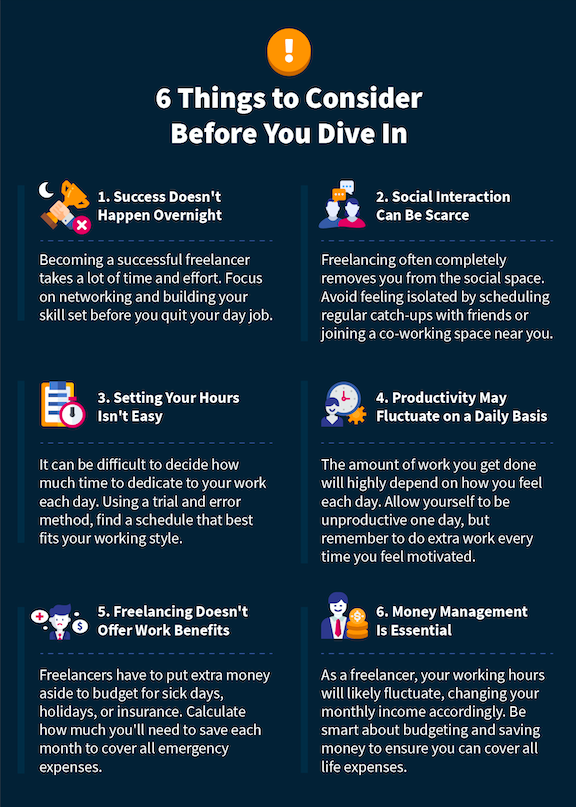5 Signs You’re Not Ready for a Freelance Career

Table of Contents
- 5 Signs a Freelance Career Is Not for You
- Key Takeaways
- Conclusion
- FAQs
Freelance careers have become quite popular due to the COVID-19 pandemic. Although it appears to be a convenient career option, there are a few drawbacks to freelancing as well. So, if you are planning to quit your regular job and take up freelancing as a full-time career, you need to analyze various aspects of this career option. When considering venturing into the gig economy, it is imperative to weigh the various pros and cons of freelancing.

5 Signs a Freelance Career Is Not for You
Here are five signs that tell you that you shouldn’t opt for a full-time freelance career.
1. There isn’t enough work to tide you over
If you want to start a full-time freelance career, the first thing you need to be sure about is the amount of work you are getting. You need to have minimum financial stability so that you can afford a stable internet connection and a phone. These are your two essential freelance requirements. Since you are planning to quit your job, you need to make sure you have a good amount of work coming to you daily.
There is a probability that you might not be able to earn impressive amounts from the very first month of freelancing. But with the gradual increase in the amount of work, your payments will shoot up. This makes it important to be aware of the freelancing pros and cons. If you think you are not getting enough freelancing work, then it may not yet be time for you to start a full-time freelance career.
2. You are not comfortable giving up your wants
When you are planning to take up freelancing as a full-time career, there are certain habits and luxuries you will have to give up: be it buying the latest electronics or designer dresses, or having dinners at expensive restaurants every week. If you are planning to switch to full-time freelancing, here is a handy tip for freelancers that usually work: it is difficult to save every penny you earn.
What you need to do is go for small expenditures. Instead of going to exotic restaurants, go to small eateries offering delicious food. If you think it is difficult for you to curb your wants, then you need to rethink opting for freelancing as a full-time career.
3. You can’t manage time
There are various pros and cons of freelancing. One of the prominent cons is improper time management. When you are planning on a full-time career in freelancing, you need to be confident about your time-management skills. One of the major indications that reflect professionalism in your work is meeting deadlines. You need to figure out how much time you need to devote to each assignment. And you need to ensure you do not rush to complete your tasks.
The quality of your work matters, as it helps you achieve regular work. But, if you feel that you are not that efficient when it comes to time management, or you are struggling with meeting your deadlines, you need to rethink this career option. What you can do is choose the time of the day when you feel most productive. If you switch to freelancing totally, then you can also devote a huge chunk of your time to your projects daily.
4. You haven’t figured out how to manage your finances
If you think a career in freelancing is a walk in the park, you need to analyze the freelancing pros and cons more closely. When you’re not earning much initially, you may not need to do your taxation. But as soon as you start to earn a taxable income, you are required to file your tax returns regularly.

If you fail to do so, you may land yourself in trouble. You might also have to pay penalties. What will you do if you are unable to manage your taxes? The best way to keep a record of your tax payments is by hiring a professional. If you think these are troublesome procedures, it is a sign that you are not ready for a full-time freelancing career.
5. You don’t have enough savings
One major drawback of starting a freelancing career is that you need to be sure of your savings. Since freelancing is an uncertain career option, and you will not get a fixed, regular salary, you need to be sure that you have savings that will help you sustain yourself for the coming six months. If you are hoping to earn a lot from the very first day of freelancing, you’re mistaken.
Key Takeaways
- Make sure you have enough freelancing work. When you are planning to quit your job and go for a freelance career, you need to be sure of the work inflow. If you get a desirable amount of work daily, then go ahead and make freelancing your main employment option.
- Prepare yourself to give up on luxuries. In the initial stages of freelancing, you will not be earning much, so you may need to give up a few habits. You will need to concentrate on saving more and spending less.
- Enhance your time-management skills. You must submit your work by the assigned deadline. If you fail to do so, it will reflect badly on your overall profile.

- You need to understand which piece of work will require more time, and operate accordingly.
- Gear up to pay taxes systematically. You may not need to pay taxes initially, but when your income starts rising, you will have to start paying tax. It is recommended that you ask a professional to help you with tax payments to avoid any penalties.
- Have a minimum amount of savings at all times. You need to have a minimum amount of money before you start off freelancing. This will help you meet medical or financial emergencies even if you are not earning much in the initial freelancing months.

Conclusion
Having a freelance career isn’t as easy as it seems. When you are leaving your regular job and planning on freelancing full-time, you are opting for the path of uncertainty. In freelancing, you will not have a regular, fixed salary. Work inflow can be erratic, and you will need to save what you earn. In addition, you won’t have an employer to cover your medical expenses. Hence, there are various disadvantages of a freelance career. If you are ready to accept all the drawbacks, only then should you opt for freelancing as a full-time career.
FAQs
You can earn a good sum of money from freelancing. But that requires some time. However, you cannot expect to earn a good figure from the very first day of freelancing. You need to be patient. As with any other profession, building your skills and gaining experience as a freelancer takes time.
Freelancing has its pros and cons. While you can work independently, you will lack financial security. In addition, your medical insurance is not covered in freelancing, like it is in a regular job. Also, you can experience phases of unemployment in freelancing. Hence, it is all about perspective.
You need to start dedicating your entire productive time to freelancing. If you stop doing any other regular job and devote your entire time to this field, then you will end up becoming a freelancer full-time. With time and dedication, you will get projects and develop your skills in this field as well.
The most profitable freelancing jobs are software and program development, social media marketing, content writing, web design, graphic design, video editing, and copywriting, to name a few.
If you have good skills and can manage time efficiently, then you can go for freelancing. A major requirement in this field is building contacts. If you are successful in doing so, you will end up getting an appreciable amount of work. This is when you can be sure that you can have a career in freelancing.
If you can work on more and more assignments every day, you will be able to earn more money. Since you are self-employed in this field, how much money you make on a daily, weekly, or monthly basis is totally up to you. The amount you earn is directly related to the workload you take on. If you continue to take up an appreciable amount of projects, you will earn loads. This will help you in accumulating wealth, provided you save up.
Latest Blogs
Explore how Google’s 2025 AI search updates triggered ranking chaos. Learn actionable strategies to adapt your SEO for AI Overviews, zero-click searches, and SERP volatility. Stay ahead now.
Learn how to rank on AI search engines like ChatGPT, Perplexity, and Gemini by optimizing your content for authority, structure, and relevance. Stay ahead in AI-driven search with this strategic guide.
Explore the best healthcare SEO services for your medical practice. Improve online visibility and effectively reach more patients in need of your services.
Get your hands on the latest news!
Similar Posts

Freelancing 101
5 mins read
11 Resources For Designers to Find Freelance Jobs Online

Freelancing 101
6 mins read
30 Freelance Industry Statistics to Get You Started

Freelancing 101
5 mins read